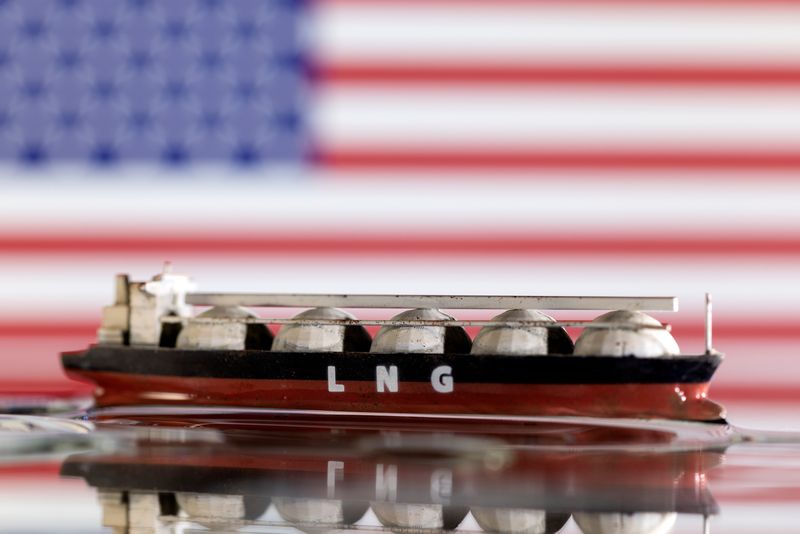Exclusive-Japan hires Wood Mackenzie to assess Trump-backed Alaska LNG project, sources say

By John Geddie and Tim Kelly
TOKYO (Reuters) -Japan has hired energy consultancy Wood Mackenzie to assess a proposed 800-mile Alaska gas pipeline and LNG plant in a sign it is weighing support for the $44 billion project touted by U.S. President Donald Trump, two sources with knowledge of the matter said.
The assessment could help assuage lingering concerns among potential Japanese off-takers and investors about a project that has languished for decades due to cost and logistical challenges, said one of the sources, requesting anonymity due to the sensitivity of the matter.
The scope and cost of the deal with Wood Mackenzie is unclear, as is whether any resulting report will be made public.
Japan’s Ministry for Economy, Trade and Industry declined to comment. Wood Mackenzie, project developers Glenfarne and the state-owned Alaska Gasline Development Corporation (AGDC) did not immediately reply to requests for comment.
Since returning to office, Trump has promised to push forward the mammoth project to move gas stranded in Alaska’s remote north across the state before being chilled and shipped overseas as liquefied natural gas (LNG).
As he wrapped up a trade deal with Japan in July, Trump said Tokyo and Washington will form a joint venture to develop an Alaskan LNG project. Japan has not confirmed such a plan.
Yet final terms of that trade deal agreed last week included a commitment by Tokyo to explore a new off-take agreement for Alaskan LNG. Japan also pledged $550 billion of unspecified U.S.-bound investments in sectors such as energy and pipelines.
“We are continuing to hold close discussions with U.S. officials on the economic viability, a forecast for starting production, and the form of cooperation, in order to realize offtake in a way that benefits both Japan and the U.S.,” Japan’s Trade Minister Yoji Muto told a press briefing in late July when asked about the Alaska LNG project.
KEY CUSTOMER
Despite Trump’s optimism, several Japanese officials and energy industry leaders have voiced doubts about the proposed cost of the project that might make the gas supply expensive relative to other sources.
Yet project developers have engaged in talks with at least five Japanese firms: JERA, Japan’s biggest LNG buyer, Tokyo Gas, Osaka Gas, trading house Mitsubishi Corp and Inpex, an oil and gas explorer whose largest shareholder is the Japanese government, the source said.
A spokesperson for JERA said it was “considering” the project. Tokyo Gas said it was “one of the candidates for procurement”. Inpex said nothing had been decided on the project. Osaka Gas and Mitsubishi declined to comment.
The Alaskan LNG developers have already penned non-binding offtake deals with state-owned Thai oil and gas company PTT Group and Taiwanese state energy firm CPC Corp.
But securing a deal in Japan would bolster the project’s chances of success. The country is the world’s No. 2 LNG buyer, a major investor in energy infrastructure, and is developing into a trading hub that could be used to resell U.S. gas to new markets in Southeast Asia.
Such a deal could also unlock financing from Japanese state banks such as the Japan Bank for International Cooperation (JBIC). JBIC said earlier this year it would consider providing support, taking into account factors such as any involvement by Japanese companies.
U.S. officials have pitched Tokyo on the security benefits of the Alaska project, stressing its proximity to Japan compared to the Middle East and the fact that shipments would avoid sensitive choke points such as the Straits of Hormuz and Malacca, and the South China Sea, Reuters has previously reported.
Japan obtains about one-tenth of its LNG from the U.S., and similar proportions from Russia and the Middle East, according to Japan’s finance ministry. Australia accounts for about 40%.
Wood Mackenzie has conducted three studies on the Alaska LNG project over the last decade commissioned by AGDC and other stakeholders.
A 2016 study ranked it poorly against other projects that could supply Asian markets like Japan, though a 2022 review that considered different financing structures and cost reductions deemed it to be competitive with U.S. Gulf Coast supply.
Alaska LNG’s developers have hired Australian engineering firm Worley to undertake a final cost estimate for the project, with the aim of reaching a final investment decision by the end of the year.
(Additional reporting by Yuka Obayashi and Katya Golubkova in Tokyo; Editing by Christian Schmollinger)









